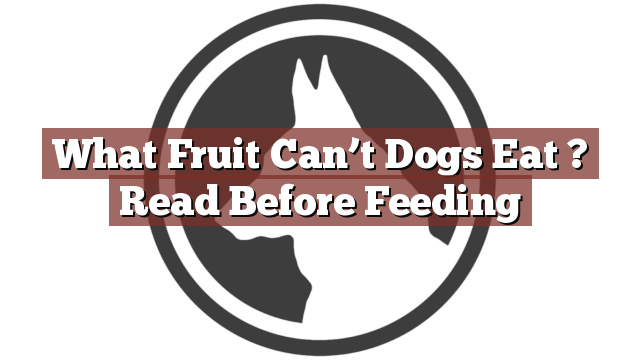Understanding Your Dog’s Dietary Needs
As responsible dog owners, it is essential to understand the dietary needs of our furry friends. While dogs are primarily carnivores, they can benefit from a well-balanced diet that includes fruits and vegetables. However, it is crucial to be aware that not all fruits are safe for dogs to consume. Certain fruits can be harmful and even toxic to our canine companions. Therefore, it is crucial to educate ourselves on what fruits dogs cannot eat and avoid any potential risks.
What Fruit Can’t Dogs Eat? Read Before Feeding
Many dog owners wonder, "What fruit can’t dogs eat?" It is essential to be cautious when introducing fruits into your dog’s diet. While some fruits are safe and beneficial, others can be harmful. Here are some fruits that dogs should avoid:
-
Grapes and Raisins: Grapes and raisins can cause kidney failure in dogs. Even a small amount can be toxic and lead to serious health issues.
-
Citrus Fruits: Citrus fruits such as oranges, lemons, and grapefruits are not toxic to dogs. However, the high acidity can upset their stomach and cause digestive issues.
-
Avocado: Avocado contains a substance called persin, which can be toxic to dogs. It can cause vomiting, diarrhea, and even heart problems.
-
Cherries: While the flesh of cherries is safe for dogs to eat, the pits and stems should be avoided. They contain cyanide, which can be poisonous.
-
Peaches and Plums: The pits of peaches and plums contain cyanide-like compounds, which can be toxic to dogs. It is best to remove the pits before feeding these fruits.
It is important to note that this is not an exhaustive list, and there may be other fruits that are harmful to dogs. If you are unsure about a specific fruit, it is always best to consult with your veterinarian before feeding it to your dog.
Pros and Cons of Feeding Fruit to Dogs
Feeding fruits to dogs can have both advantages and disadvantages. Here are some pros and cons to consider before incorporating fruits into your dog’s diet:
Pros:
-
Nutritional Benefits: Some fruits, such as apples and bananas, are packed with vitamins, minerals, and fiber, which can be beneficial for your dog’s overall health.
-
Hydration: Many fruits, like watermelon and berries, have high water content, which can help keep your dog hydrated, especially during hot weather.
-
Treat Alternative: Fruits can be a healthier alternative to store-bought treats that often contain artificial ingredients and preservatives.
Cons:
-
Digestive Issues: Some dogs may have digestive sensitivities to certain fruits, leading to diarrhea, vomiting, or gas.
-
Allergies: Just like humans, dogs can develop allergies to certain fruits. It is important to monitor your dog for any signs of an allergic reaction, such as itching or swelling.
-
Caloric Intake: Fruits, although healthy, can also add to your dog’s calorie intake. It is crucial to consider the portion sizes and adjust your dog’s regular diet accordingly.
It is always recommended to introduce new fruits gradually and monitor your dog’s reactions. If you notice any adverse effects, it may be best to avoid that particular fruit in the future.
Conclusion
While fruits can offer some health benefits to dogs, it is crucial to be aware of what fruits can’t dogs eat to ensure their well-being. Avoid giving your dog grapes, citrus fruits, avocado, cherry pits, or peach and plum pits. Always consult with your veterinarian if you are unsure about a specific fruit. Remember to introduce fruits slowly and in moderation, and monitor your dog for any adverse reactions. By being cautious and informed, you can provide a balanced and safe diet for your furry companion.
Thank you for taking the time to read through our exploration of [page_title]. As every dog lover knows, our furry friends have unique dietary needs and responses, often varying from one canine to another. This is why it's paramount to approach any changes in their diet with caution and knowledge.
Before introducing any new treats or making alterations to your dog's diet based on our insights, it's crucial to consult with a veterinarian about [page_title]. Their expertise ensures that the choices you make are well-suited to your particular pet's health and well-being.
Even seemingly harmless foods can sometimes lead to allergic reactions or digestive issues, which is why monitoring your dog after introducing any new food item is essential.
The content provided here on [page_title] is crafted with care, thorough research, and a genuine love for dogs. Nevertheless, it serves as a general guideline and should not be considered a substitute for professional veterinary advice.
Always prioritize the expert insights of your veterinarian, and remember that the health and happiness of your furry companion come first.
May your journey with your pet continue to be filled with joy, love, and safe culinary adventures. Happy reading, and even happier snacking for your canine friend!

